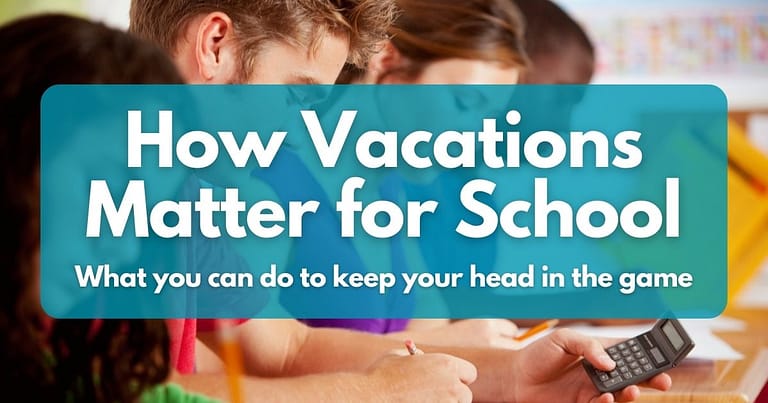Summary:
Spring break is almost here and soon after summer vacation will follow. Everyone should take advantage of the time off by having fun and engaging in activities to keep their brains active. It’s important to keep the mind stimulated and active during breaks from school, especially over summer break! Here’s what you can do to stop the brain drain.
Transcript:
0:00:03: In today’s lesson, we’re going to talk about vacations. Spring Break is right around the corner and not too long after that Summer Vacation. And I hope you guys are going to go out and have a lot of fun and do something enjoyable. Whatever you choose to do over those breaks. However, I do want you to think about taking those breaks, using time during those breaks, to keep up with school, to get caught up on some things that you haven’t done, to keep your brain engaged, maybe just to keep your brain engaged by doing some reading, by doing some creative work…
0:00:34: …something that is going to keep you active, keep you mentally active. Now, there are lots of things that you can do over a short break, like Spring Break. And as I mentioned, reading is one of my favorite things. If you enjoy reading, grab a book. It doesn’t have to be some great work of literature. It doesn’t have to be War and Peace. It can be a summer beach-read, just something you enjoy to keep your mind working.
0:00:57: If you are struggling in a math class or a science class or some other class, take some time to review the material from that class. You can spend maybe a few minutes, a couple/ three days over a short break getting that material into your head a little bit more. Don’t feel like you have to go crazy unless you’re really behind and you need to catch up on something. But I do want to talk maybe more specifically about summertime, because “summer brain drain” is a real thing and it affects people.
0:01:28: Studies show that students, over the summer, lose approximately three months of learning in math and English. You’re out of school for three months…it’s not that you end here and then you start here and go forward. You end here, you start back three months and have to catch up at the beginning of the year. Now you can overcome that. And what you have to do is just find a way to get the brain engaged mathematically, with some literature, something that’s going to keep you on track.
0:02:01: If you happen to be a sophomore or a junior, it’s a great time to do a little test prep and do some SAT or ACT prep. And that keeps your brain engaged on both the verbal side and the math and science side. The left brain and right brain. And it’s a great way to do that. But there are all sorts of things you can do. You can have a book club, you can go to a camp that has some classes. You can take a short class. You can do something on Khan Academy, something that you really enjoy doing. It doesn’t have to be anything super intense.
0:02:29: But I do want you to keep going over the summer in a way that’s going to keep that brain engaged. Now, the last thing I would suggest in the last two or three weeks before school starts at the end of the summer: Do some pre-learning. We talked about this in another video. Do some pre-learning. Preview some of the courses you’re going to take in the beginning of the school year, especially if you’re taking any honors or AP or IB classes, something that’s a little more challenging.
0:02:58: You want to do a preview of those classes by looking through the textbook, doing a little bit of reading. You could work with a tutor who can help you get through the first, say, six weeks of a class so that when you get to school, you absolutely hit the ground running. Now, this does a couple of things. One, it makes your life a lot easier once you get to school. Yeah, it’s a bit of a pain to study at the end of summer. I get it.
0:03:19: But it makes you much more prepared. When you get to school, things are going to be much easier. Two, your teacher is going to think you’re kind of a rock star if you know what’s going on already, and that means they’re going to put you in the box of “good student,” and if they put you in the good student box, you’re likely to stay in the good student box. Teachers are people, and they make snap judgments, and they keep people in a little box that they don’t deserve to be in just because of their first experience. So make a good impression. It also can help you stay ahead of the curve, especially in these challenging, say, junior year months, when you’re also thinking about colleges and test prep and all that other stuff that goes with a more challenging year, getting ready to apply to college.
0:04:02: All right, I hope that helps, and I’ll catch you next time. Thank you for watching, and for more information you can go to our website for more videos on our blog, or subscribe to our YouTube or Instagram feeds. And don’t forget, Aim Higher!






